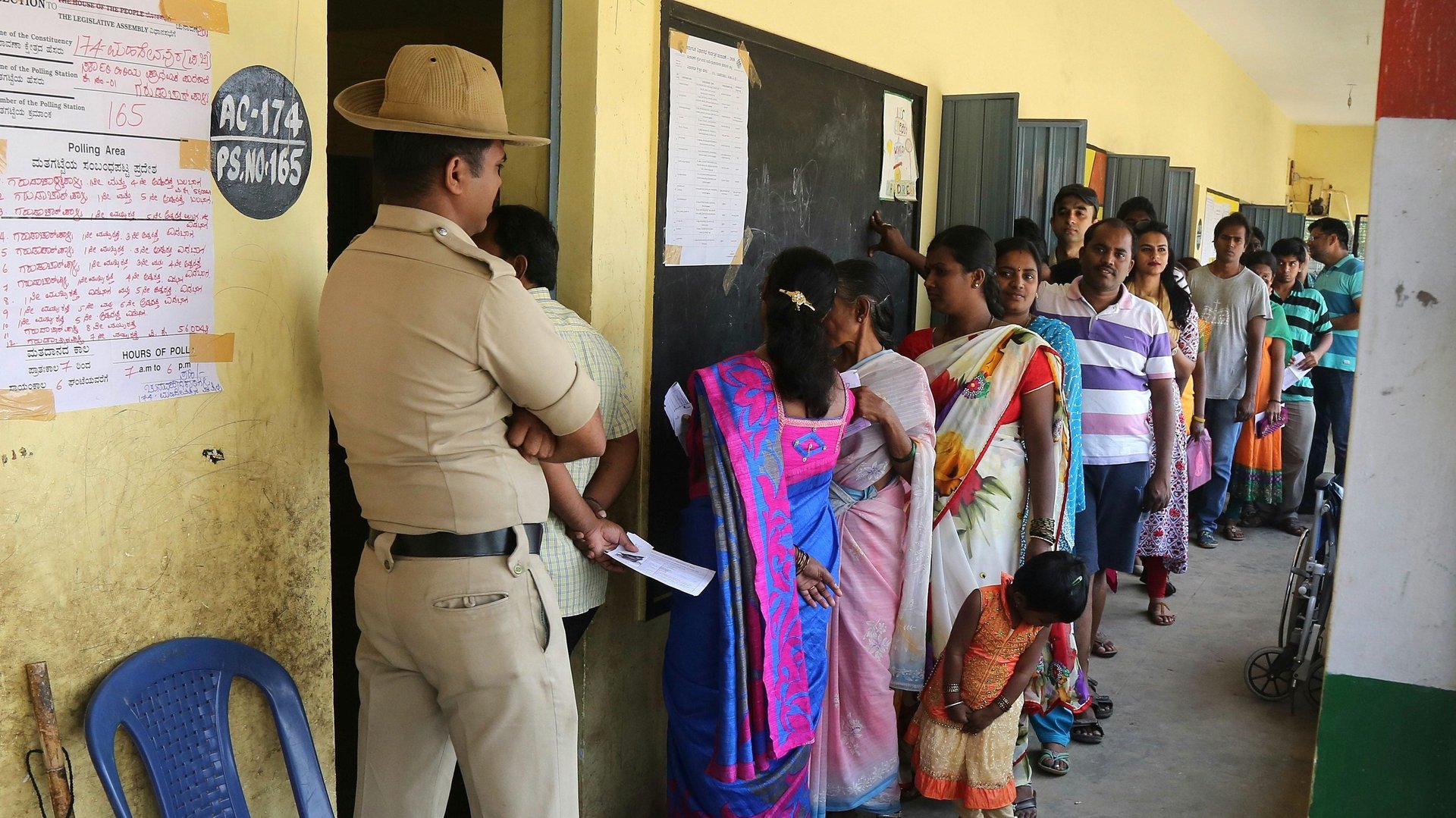Why Bengaluru’s techies don’t care about the Karnataka elections
India’s Silicon Valley, it appears, is more interested in Sunny Leone than Siddaramaiah.


India’s Silicon Valley, it appears, is more interested in Sunny Leone than Siddaramaiah.
On May 12, when the southern Indian state of Karnataka held assembly elections, the turnout in its capital city, Bengaluru, was thin. The state saw a record 72.13% voter turnout, but only 51% came out to vote in Bengaluru.
“Bengalureans believe more in tweeting than voting,” was the running joke on election day in a city that is famous for its serpentine traffic jams, poor drainage systems, and frothy toxic lakes.
According to government figures, over 3.6 million residents of Bengaluru worked in the tech sector directly and indirectly in 2013. By 2020, the city is estimated to become the “single-largest IT cluster on the planet,” with over 8 million tech professionals.
While these techies are vocal on social media about civic issues, they’re largely indifferent towards electing a candidate who can bring about change.
“I am on eight startup-related WhatsApp groups, which are all very active throughout the day and even at night. We discuss everything there, from coding hacks to the weather. But there was not a word about the elections on most groups. On one group there was some chat about stocking beer because alcohol shops would be shut from the day before the voting,” a 36-year-old entrepreneur said, requesting anonymity.
“On Sunday (May 13), there were discussions even about Sunny Leone’s birthday on some of the groups. It just shows that she is of more interest to the community than who comes to power in Bengaluru,” he added.
Quartz spoke to over a dozen entrepreneurs and tech employees for this story. Only two of them had cast their votes in the recent elections. Many others were not even aware of the names of their constituencies or the candidates contesting from there.
The migrant issues
Bengaluru attracts thousands of professionals from across the country each year to work at its technology firms. To cast their vote in the city, these individuals need to get themselves registered in the local voters’ list. At least three entrepreneurs said this process put them off.
On election day, John Santosh, founder and CEO of cloud-based software solutions firm GIEOM, started an “internal campaign,” asking his teammates to share photos of their inked fingers on WhatsApp. “My company works with the (central) government and several public sector companies, so I understand why elections matter,” he said.
But only 22 of the 40-member team could vote. ”Many of the others are not from Bengaluru, so they are not on the system,” Santosh said. “But that said, if they had really wanted to vote, they could have enrolled themselves.”
But getting enrolled on the voters’ list can be difficult.
A 32-year-old entrepreneur said he had tried to get enrolled into the system back in 2014 ahead of the general elections but could not produce all the required documents. “They asked for a proof of residence and since I was staying with some friends back then, I did not have any documents to provide,” he said. “After that, I just lost all interest.”
Matters that don’t matter
Much of Karnataka’s politics revolves around the local caste divide, with three politically influential caste groups—the Lingayats, Vokkaligas, and Kurubas—being central to the campaigns of several political parties.
This agenda does not resonate with most techies.
“Caste is an issue that should not be a political issue at all. It’s something that was a problem many many years ago, given that some areas in India still suffer from that divide,” said Jaideep Singh, co-founder of Ambee, which sells ultraportable devices that measure air quality. “But to have political leanings and political affiliations based on caste is just ludicrous in this day and age.”
Election results don’t have any bearing on their business, according to some entrepreneurs, which is why they don’t see the need to vote.
“I am pretty agnostic to which party comes to power. At the end of the day, a team has to focus on its core business to get more customers and grow. A government cannot help you with that, so it doesn’t really matter,” said Avinash Saurabh, founder and CEO of healthcare startup Zoojoo.be. While Saurabh voted in the recent elections—his first time since he moved here eight years ago—almost 80% of his 50-member team did not, he said.
For similar reasons, some professionals said they were simply too busy to prioritise elections over their work. A city-based independent startup consultant said he got the form for getting enrolled in the voters’ list, but missed the last date for submission because he was busy chasing his work-related deadlines.
“I have been living in Bengaluru for about 10 years and I still don’t have a vote here. This time, there was a drive to enroll new voters in the complex where I live. I even got the form from there, but then there was so much work, I was too busy to fill it and submit it,” he said. “It’s still lying in my drawer.”